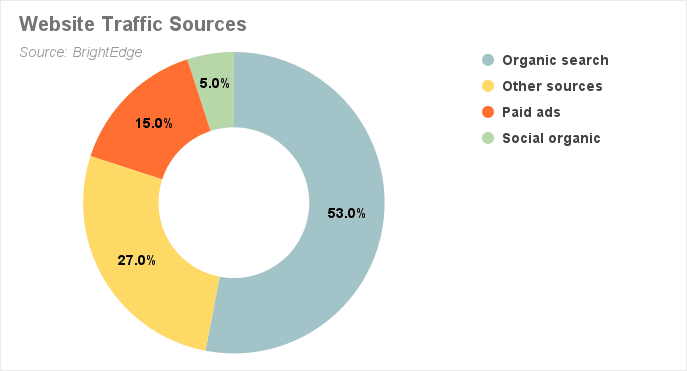When it comes to building a church website one of the first questions we ask every client is “Who are you trying to reach?” This is the question of church website targeting.
While we have heard every answer under the sun to that question, there is one that we seem to get more often than all the others. Churches consistently tell us “We want to reach everybody.”
Often they will accompany that answer with a very spiritual backing. “Jesus accepted everyone, so I think we should do the same.” Well, we agree with you that both Jesus and your website should accept everybody, but the question of targeting is a very different one.
Good church websites always have a keen understanding of who they are aimed at and what that target is looking to get from your website visit. When we target well we will be able to turn many more visitors to our website into visitors on Sunday Morning.
Let’s learn more.
Estimated reading time: 10 minutes
Table of contents
Church Website Targeting

Before we jump into our top 5 website targeting questions, let’s explore everything you need to know about website targeting. What is it, what’s the point, and why should you care? We’ll also explore a little about search engines and SEO, which will be very helpful if you want your website to get more traffic.
What is Website Targeting?
Website targeting involves tailoring your church website to attract and engage specific audiences. For church websites, this means focusing on current members, potential visitors, and the local community. Effective website targeting helps ensure that your church’s online presence is relevant and appealing to these groups.
Using website builders, you can create a church website design that highlights important features like church events, service times, and community activities. A well-targeted website makes it easier for people to find the information they need and encourages them to participate in church activities.
Why Focus on Search Engines?
Search engines like Google play a crucial role in helping people find information online. When someone searches for a church in your area, you want your website to appear at the top of the search results. This is where search engine optimization (SEO) comes in. Church SEO involves optimizing your website to improve its visibility on search engine results pages.
By using specific keywords related to your church and its activities, you can improve your website’s ranking. Keywords like “church events,” “local community,” and “church leaders” help search engines understand the content of your website and show it to the right people. Effective church SEO ensures that more people can discover your church and join your community.
According to BrightEdge, over half of website traffic comes from organic searches.

So SEO is no joke! It is the primary way you will reach new people!
Benefits of Effective Church Website Design
A well-designed church website not only attracts visitors but also serves as a valuable resource for your congregation. Clear, user-friendly design and easy navigation are essential components of effective church website design. When your website is easy to use, people can quickly find information about church events, service times, and ways to get involved.
Church leaders should focus on creating a website that reflects the values and mission of the church. This includes using website builders that offer templates and tools specifically designed for churches. A strong online presence helps build a sense of community and keeps members informed and engaged.
In summary, targeting your church website involves creating relevant content, optimizing for search engines, and designing a user-friendly site. By focusing on these areas, church leaders can ensure their website serves as a vital tool for outreach and engagement in the local community.
Top 5 Website Targeting Questions

Here is our list of the top 5 questions you should ask yourself when focusing on your website targeting. You want to spread your church’s mission as far and wide as you can. You want people to come to your church, listen to your online sermons, and join your community. By asking yourself these questions, you can begin to hone in your website targeting.
1. Where is my ideal visitor?
Let’s start with an easy one. Even the staunchest opponents to targeting will at least concede that they are trying to reach an audience in a specific location.
Every church knows that not everyone in the world is a good candidate to come and worship with them this Sunday. Studies say that in most regions people will not travel more than 20 minutes to come to church. While there will be some exceptions to this rule, we know that we need to target those closest to our gathering places.
At my church, The Journey, we meet in an urban part of Madison, Wisconsin. While we do have several families who travel from the suburbs, we are unapologetically focused on reaching the people of Madison. We use imagery of Madison that will appeal to someone in town more than someone from the surrounding communities.
We have realized that if we focus on those closest to our church, we will get better results even if that means that those a little further out will be less engaged.
2. How old is my ideal visitor?
If we take a second to be truly honest I think we can probably agree that our church services appeal to a certain age range more than others. From music choices to design aesthetics, we are targeting people of a certain age. The only question is whether or not we are intentional about this.
“But we have Betty who just celebrated her 85th birthday, so we are here for everyone.” Again there will always be outliers. The point is that we need to recognize who we will most likely appeal to and target in that direction.
The answer to the question of who you will appeal to isn’t usually too hard to answer. Unless you are specifically targeting a new age demographic, you are probably appealing to the people who are worshiping with you on Sunday.
Are you an older church? Don’t mislead people with pictures of nothing but college students on your website. Are you a a church full of college students that doesn’t offer a children’s ministry? Make sure you communicate that so your audience knows.
3. What life phase is my ideal visitor in?

I have asked this question to churches for years and the answer I get most of the time is “young families”. That is great, but no matter what life place you are targeting, make sure you are communicating about what matters to them.
Good web design is always about answering your visitors questions, not telling them about yourself.
If you are targeting young families, make sure you answer the question of what you offer for kids and how long your service is. If you are targeting young professionals, make sure you highlight the ways church members can make a personal connection.
Once you understand the life place of your target, try to think like them and answer any questions they may have.
4. What do I want my ideal visitor to do next?
This goes along with the post I wrote about the call to action. The right call to action to use on your website is dependent on who you are trying to reach.
If you are trying to reach a young population, a good call to action might be following your church on Twitter or Instagram. If you have a church full of families, Facebook might be a better place to connect. And if you are in an urban setting with lots of people in need of help, maybe a prayer form is the right call to action.
Remember who your audience is and tailor your call to action to them.
If we keep our target in mind when we build a website we can do something that will lead more site visitors in to Sunday visitors. While I believe everyone needs to head the Gospel, God made each one of us with the ability to reach a specific kind of person better than anyone else. Our website ought to reflect that.
5. How does my ideal visitor find information?
Understanding how your ideal visitor finds information is crucial for designing an effective church website. People have different preferences and habits when it comes to searching for information. Here are some key ways they might find information about your church:
- Search Engines: Many people start their search for a new church by using search engines like Google. They might type in keywords like “churches near me” or “church events in [your city].” Ensuring your website is optimized for search engines (SEO) can help your church appear in these search results.
- Social Media: Platforms like Facebook, Instagram, and Twitter are popular places for people to discover new churches. Sharing updates, events, and engaging content on social media can attract potential visitors.
- Word of Mouth: Recommendations from friends, family, and colleagues are powerful. People often trust the opinions of those they know, so encouraging your congregation to share their positive experiences can help spread the word.
- Local Community Boards: Online community boards, forums, and local event listings can also be useful. Posting about your church and upcoming events on these platforms can reach people who are active in your local area.
- Church Websites: Many people visit church websites directly. Having a user-friendly, informative website is essential for providing the information they need quickly and easily.
When you know your ideal visitor, you know where to find them. That is then where you should focus your attention. Is it on social media? Is it through your website? It is word of mouth? This way, you’ll be using your efforts to reach the people that you actually want to reach.
Reaching Your Target Audience

In conclusion, targeting your church website effectively is essential for engaging both current members and potential visitors. By understanding who your ideal visitor is and how they find information, you can tailor your website to meet their needs and preferences.
Incorporating church SEO practices ensures that your website ranks well on search engines, making it easier for people to discover your church. Utilizing website builders designed for churches can help create a visually appealing and user-friendly design that highlights important aspects like church events, service times, and community activities.
Focusing on these elements not only improves your online visibility but also fosters a stronger sense of community within your church. Church leaders play a crucial role in maintaining an updated and engaging website, reflecting the church’s mission and values. A well-targeted church website serves as a vital tool for outreach, helping to grow and strengthen your congregation.
By prioritizing website targeting, your church can connect with the local community more effectively, ensuring that your message reaches those who need it most. With the right approach, your church website can become a welcoming gateway for people seeking spiritual growth and community support. God bless!




